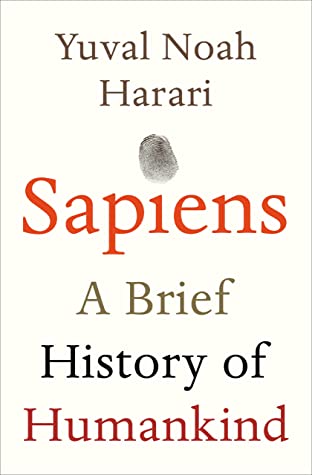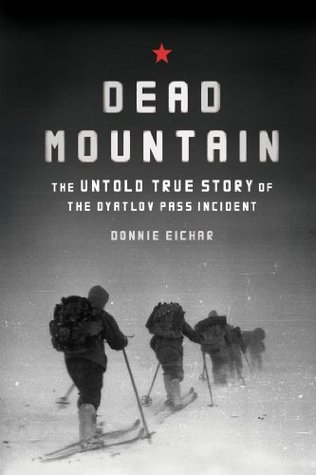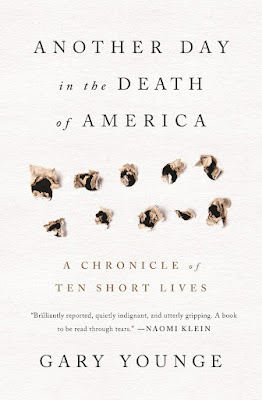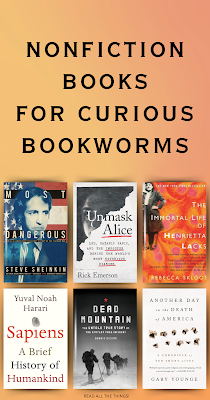 |
| This post contains affiliate links. I earn a commission from qualifying purchases. |
Do you enjoy learning things? Do you hate boring textbooks? Me too! Here are ten books that will teach you something new, but will not bring back high school nightmares. I promise there's no exam at the end of these books.
Best Informative Books
THE IMMORTAL LIFE OF HENRIETTA LACKS BY REBECCA SKLOOT
Biography
Her name was Henrietta Lacks, but scientists know her as HeLa. She was a poor Southern tobacco farmer who worked the same land as her enslaved ancestors, yet her cells—taken without her knowledge—became one of the most important tools in medicine. The first “immortal” human cells grown in culture, they are still alive today, though she has been dead for more than sixty years. If you could pile all HeLa cells ever grown onto a scale, they’d weigh more than 50 million metric tons—as much as a hundred Empire State Buildings. HeLa cells were vital for developing the polio vaccine; uncovered secrets of cancer, viruses, and the atom bomb’s effects; helped lead to important advances like in vitro fertilization, cloning, and gene mapping; and have been bought and sold by the billions.
Yet Henrietta Lacks remains virtually unknown, buried in an unmarked grave.
Why I recommend it: Everybody should read this book. It brings up topics that society really needs to discuss.
Who was Henrietta Lacks? That's what the book is about. Henrietta's cells were taken after her death and used without her permission. Her children and grandchildren are living in poverty and have not gotten any money from the use of her body. Henrietta's grave doesn't even have a headstone. This all feels very wrong.
For me, the most interesting part of the book is the ethical questions it brings up. Who should profit from biological specimens? If you give a doctor permission to cut out your tumor, do you forfeit your rights to that tumor? What if someone uses it to make a ton of money?
I couldn't stop reading this book. I loved learning about Henrietta and the people whose biological samples have made life better for all of us.
Support Independent Bookstores
UNMASK ALICE: LSD, SATANIC PANIC, AND THE IMPOSTER BEHIND THE WORLD'S MOST NOTORIOUS DIARIES BY RICK EMERSON
Biography
In 1971, Go Ask Alice reinvented the young adult genre with a blistering portrayal of sex, psychosis, and teenage self-destruction. The supposed diary of a middle-class addict, Go Ask Alice terrified adults and cemented LSD's fearsome reputation, fueling support for the War on Drugs. Five million copies later, Go Ask Alice remains a divisive bestseller, outraging censors and earning new fans, all of them drawn by the book's mythic premise: A Real Diary, by Anonymous.
But Alice was only the beginning.
In 1979, another diary rattled the culture, setting the stage for a national meltdown. The posthumous memoir of an alleged teenage Satanist, Jay's Journal merged with a frightening new crisis—adolescent suicide—to create a literal witch hunt, shattering countless lives and poisoning whole communities.
In reality, Go Ask Alice and Jay's Journal came from the same dark place: Beatrice Sparks, a serial con artist who betrayed a grieving family, stole a dead boy's memory, and lied her way to the National Book Awards.
Unmask Alice: LSD, Satanic Panic, and the Imposter Behind the World's Most Notorious Diaries is a true story of contagious deception. It stretches from Hollywood to Quantico, and passes through a tiny patch of Utah nicknamed "the fraud capital of America." It's the story of a doomed romance and a vengeful celebrity. Of a lazy press and a public mob. Of two suicidal teenagers, and their exploitation by a literary vampire.
Unmask Alice . . . where truth is stranger than nonfiction.
Why I recommend it: It's the story of Mormon con artist Beatrice Sparks and how her collection of phony diaries sparked (hahaha) the Satanic Panic in the 1980s.
There's a lot going on in Unmask Alice. It's a mix of biography and history. It examines young adult literature and why it's so compelling. It's also a critique of the publishing industry and how it consistently puts profit ahead of people.
The author of Unmask Alice—Rick Emerson—was clearly inspired by Beatrice Sparks. Just like in Sparks' books, Unmask Alice has breakneck pacing and a plot that goes in a million directions at once. It leaves the reader breathless. You don't want to stop reading to question what's real. Like Sparks, the author inserts his opinions into everything. It's nonfiction, so you're inclined to believe what he's saying, but . . . the whole book is about an author who lied in nonfiction. How "nonfiction" is "nonfiction"? This book makes you question everything you've ever read.
I recommend Unmask Alice to anyone who's interested in 1980s culture or the publishing industry. It's provocative for sure.
Support Independent Bookstores
SAPIENS: A BRIEF HISTORY OF HUMANKIND BY YUVAL NOAH HARARI
History
100,000 years ago, at least six human species inhabited the earth. Today there is just one. Us. Homo sapiens.
How did our species succeed in the battle for dominance? Why did our foraging ancestors come together to create cities and kingdoms? How did we come to believe in gods, nations and human rights; to trust money, books and laws; and to be enslaved by bureaucracy, timetables and consumerism? And what will our world be like in the millennia to come?
In Sapiens, Dr Yuval Noah Harari spans the whole of human history, from the very first humans to walk the earth to the radical–and sometimes devastating–breakthroughs of the Cognitive, Agricultural and Scientific Revolutions. Drawing on insights from biology, anthropology, paleontology and economics, he explores how the currents of history have shaped our human societies, the animals and plants around us, and even our personalities. Have we become happier as history has unfolded? Can we ever free our behavior from the heritage of our ancestors? And what, if anything, can we do to influence the course of the centuries to come?
Bold, wide-ranging and provocative, Sapiens challenges everything we thought we knew about being human: our thoughts, our actions, our power, and our future.
Why I recommend it: If you took everything that interests me about humans and crammed it into one book, you’d come up with this one. It delivers exactly what it promises in the title. It’s provocative and thought-provoking.
I didn’t always agree with the author’s conclusions (especially about the agricultural revolution), but he argues his points well enough that I can see where he’s coming from. I’m surprised at how quickly I flew through this book. It’s massive and more academic than what I usually read, but I couldn’t put it down because the writing style is engaging, and the author asks interesting questions. I love that the book focuses on humanity as a whole and not on individual humans. I need to find more history books like this one. Recommendations, please.
Support Independent Bookstores
DEAD MOUNTAIN: THE UNTOLD TRUE STORY OF THE DYATLOV PASS INCIDENT BY DONNIE EICHAR
Historical Mystery
In February 1959, a group of nine experienced hikers in the Russian Ural Mountains died mysteriously on an elevation known as Dead Mountain. Eerie aspects of the incident—unexplained violent injuries, signs that they cut open and fled the tent without proper clothing or shoes, a strange final photograph taken by one of the hikers, and elevated levels of radiation found on some of their clothes—have led to decades of speculation over what really happened. This gripping work of literary nonfiction delves into the mystery through unprecedented access to the hikers' own journals and photographs, rarely seen government records, dozens of interviews, and the author's retracing of the hikers' fateful journey in the Russian winter.
Why I recommend it: A few years ago, I became obsessed with the Dyatlov Pass incident and read everything I could find on the internet about it. It's a freakin' terrifying mystery!
This book is the author's attempt to solve the mystery. He mixes the hikers' photos and journal entries with police reports and interviews. It's a short book, and it feels very personal. You really start to care about the young hikers. Even though I already knew all the theories about what happened to them, I couldn't put the book down. If you like unsolved mysteries or wilderness disaster stories, you need to read this one. I don't want to say more because I don't want to spoil the mystery for you.
Support Independent Bookstores
Being Mortal: Medicine And What Matters In The End by Atul Gawande
Medicine
Medicine has triumphed in modern times, transforming birth, injury, and infectious disease from harrowing to manageable. But in the inevitable condition of aging and death, the goals of medicine seem too frequently to run counter to the interest of the human spirit. Nursing homes, preoccupied with safety, pin patients into railed beds and wheelchairs. Hospitals isolate the dying, checking for vital signs long after the goals of cure have become moot. Doctors, committed to extending life, continue to carry out devastating procedures that in the end extend suffering.
Gawande, a practicing surgeon, addresses his profession's ultimate limitation, arguing that quality of life is the desired goal for patients and families. Gawande offers examples of freer, more socially fulfilling models for assisting the infirm and dependent elderly, and he explores the varieties of hospice care to demonstrate that a person's last weeks or months may be rich and dignified.
Why I recommend it: I love this book because it's relevant to every reader. We'll all die eventually. The author argues that medicine isn't always the answer to every health problem. Medicine has advanced so much that we can keep people's bodies alive long after their brains are dead. Should we be doing that? Are we prolonging life, or just prolonging suffering?
For me, the most interesting part of the book is the conversation about what makes life worth living. That's a question that each individual person has to think about. Ideally, it's something you think about and write down before you become sick. Do you want a long life if you're unconscious and being kept alive by machines? Do you want a long life if the pain medication stops working? What about food and mobility? Could you live the rest of your life with a feeding tube? What if you're conscious but unable to move on your own?Planning for the end of your life is uncomfortable, but it's worth the discomfort. If you're dying, you probably want to spend time with your family. You don't want to spend time making complicated decisions about what happens to yourself and your stuff.
This is one of those rare books that I recommend to everybody. I think every reader could get something out of it.
I Contain Multitudes: The Microbes Within Us And A Grander View Of Life by Ed Yong
Biology
Every animal, whether human, squid, or wasp, is home to millions of bacteria and other microbes. Many people think of microbes as germs to be eradicated, but those that live with us—the microbiome—build our bodies, protect our health, shape our identities, and grant us incredible abilities. In this astonishing book, Ed Yong takes us on a grand tour through our microbial partners, and introduces us to the scientists on the front lines of discovery.
Why I recommend it: I spend more time than I'd like to admit thinking about "bad" microbes. I don't give much thought to the others. This book is about the others!
Have you ever been curious about the microbes that live on (and in) you? Why are they there? What do they do? It turns out that they kind of do everything. They make up part of your immune system and help you digest food. They can even influence your behavior. Humans aren't the only ones who rely on microbes to stay healthy. Microbes are in plants, animals, dirt, and the air we breathe. Everything is an ecosystem.For a biology book, this one is extremely accessible. You don't have to Google anything to decipher what the author is yapping about. He talks about a wide variety of fascinating microbes and what they do for the humans and animals they have colonized.
ANOTHER DAY IN THE DEATH OF AMERICA: A CHRONICLE OF TEN SHORT LIVES BY GARY YOUNGE
Sociology
On an average day in America, seven children and teens will be shot dead.
In Another Day in the Death of America, award-winning journalist Gary Younge tells the stories of the lives lost during one such day. It could have been any day, but he chose November 23, 2013. Black, white, and Latino, aged nine to nineteen, they fell at sleepovers, on street corners, in stairwells, and on their own doorsteps. From the rural Midwest to the barrios of Texas, the narrative crisscrosses the country over a period of twenty-four hours to reveal the full human stories behind the gun-violence statistics and the brief mentions in local papers of lives lost.
This powerful and moving work puts a human face—a child's face—on the "collateral damage" of gun deaths across the country. This is not a book about gun control, but about what happens in a country where it does not exist. What emerges in these pages is a searing and urgent portrait of youth, family, and firearms in America today.
Why I recommend it: It's a thought-provoking look at the stories behind the statistics. It's not a book about gun control or the second amendment. It's just a story about what happens when children have easy access to guns and not enough education about them.
This book will stay with me forever because it shows how quickly and pointlessly life can end. Two kids got ahold of their parents' gun and decided to play with it. A lonely teen befriended a gang member. Sometimes a decision that seems spontaneous and inconsequential can end up altering an entire community.
Support Independent Bookstores
Most Dangerous: Daniel Ellsberg And The Secret History Of The Vietnam War by Steve Sheinkin
Biography
In 1964, Daniel Ellsberg was one of the Pentagon insiders helping to plan a war in Vietnam. The mountainous Asian country had long been a clandestine front in America's Cold War with the Soviet Union. The U.S. Government would do anything to stop the spread of communism—with or without the consent of the American people.
But as the fighting in Vietnam escalated. Ellsberg turned against the war. He had access to a top-secret government report known as the Pentagon Papers and knew it could blow the lid off of years of government lies. But did he have the right to expose decades of presidential secrets? And could one man, alone, face the wrath of the government?
This is the story of the seven bloody years that transformed Daniel Ellsberg from a government insider into "the most dangerous man in America," and of the storm that would follow when the secrets of the Vietnam War were finally known.
Why I recommend it: Don't let the serious suit man on the cover fool you. This book is wild. The pace moves like a thriller novel, and the author doesn’t leave out any of the scandalous (or slightly gory) details. I love that the author includes quotes from soldiers and photos from Vietnam. It shows the reasoning behind Daniel Ellsberg’s decision to leak the documents. People were dying in Vietnam because Washington couldn’t get its act together. The author really helps the reader understand Ellsberg’s frustration.
Most Dangerous kept me awake way past bedtime. I kept thinking, One more chapter, one more chapter. Then it was 2:00 in the morning, and I’d finished the book. Even if you’re not in love with politics, it’s worth reading. It’s full of twists that will make your jaw drop. This is definitely not a dry textbook (even though the cover looks like one).
Support Independent Bookstores
Black Like Me by John Howard Griffin
Historical Journalism
In the Deep South of the 1950s, journalist John Howard Griffin decided to cross the color line. Using medication that darkened his skin to deep brown, he exchanged his privileged life as a Southern white man for the disenfranchised world of an unemployed black man. His audacious, still chillingly relevant eyewitness history is a work about race and humanity—that in this new millennium still has something important to say to every American.
Why I recommend it: Griffin’s diary shows the day-to-day challenges of being a Black person in the South. It definitely deepened my understanding of segregation because it includes a lot of information that I don’t remember learning in school. I knew that the South in the 1950s wasn’t a wonderful place, but it’s shocking how horrible people can be to each other.
Also, it made me sad that a white man had to live through segregation and racism before other white people would take it seriously. During the time that John Howard Griffin was conducting his experiment, there were Black activists trying to draw attention to the problems in the South. Many white people refused to listen to the activists. This book was groundbreaking when it was published because it was one of the first times that a white person had written extensively about the experiences of Black people. John Howard Griffin was seen as a “credible source” by many white people who wouldn’t listen to the activists.The diary discusses Griffin’s transition back to his regular life. This is one of the most interesting parts because it shows the hatred and mistrust that the races had for each other. After Griffin’s skin turned white again, it was no longer safe for him to be in the Black neighborhoods. When the experiment was made public, he was called a “race traitor” and had to move his family to Mexico to avoid angry white supremacists.
If you're interested in history, you need to read this book.
Evicted: Poverty And Profit In The American City By Matthew Desmond
Economics












Lots of good reads here. Having lived for a decade in Utah, think I would like to read "Unmasking Alice." There are a lot of scams out of that place. Have you read "The Mormon Murders"?
ReplyDeleteGreat list! Dead Mountain is one that will stay with me for a long time.
ReplyDeleteStill salty about Alice since I read that book as a "real" story when I was a teen.
ReplyDeleteI have two of these on my TBR list: I Contain Multitudes and Sapiens. My most recent nonfiction read that made a huge impression on me was Braiding Sweetgrass by Robin Wall Kimmerer. My TBR has several books on the history of fabric and on fiber arts that I'd like to read soon, but currently, I'm reading a history of the Regency decade by Robert Morrison, for research.
ReplyDeleteI don't read much nonfiction, but I'm pretty sure I've picked up a few on your recommendation in the past and was never sorry. Ask Alice sounds very intriguing!
ReplyDelete